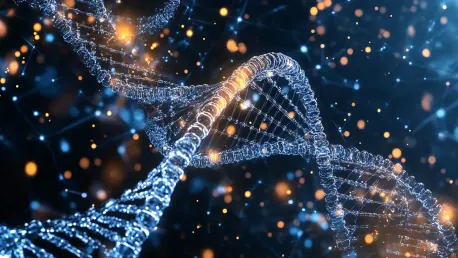The staggering growth of digital data has presented an urgent need for innovative storage solutions, with projected volumes reaching an immense 180 zettabytes imminently. As traditional data storage mediums struggle to handle this explosion, attention has turned to DNA storage technology, which blends digital information with biological molecules. DNA, with its remarkable density and stability, promises a revolutionary step forward. However, a significant hurdle remains in the retrieval speed required to make this technology feasible and widely adopted in the market.
Breakthrough in DNA Data Retrieval Speed
To address this challenge, researchers at Technion – Israel Institute of Technology have developed an advanced AI model named DNAformer, designed specifically to revolutionize data retrieval from DNA strands. This model exemplifies a significant leap over current methods, which can be painstakingly slow. Based on a transformer model trained on synthetic data, DNAformer accelerates data recovery by an impressive factor of 3,200. This dramatic enhancement not only opens the door to faster access but also aligns DNA storage technology with practical, everyday needs of businesses and organizations that rely on swift data processing.
Moreover, DNAformer incorporates a robust custom error-correcting algorithm, which boosts data accuracy by up to 40 percent. This improvement is critical, as ensuring data integrity is paramount for any storage technology to be viable. The AI-driven approach not only addresses substantial issues but also demonstrates versatility with its application to various data types. In testing, DNAformer successfully retrieved 3.1 megabytes of diverse data formats, including images, audio, and text, in the unprecedented span of just 10 minutes, a task previously taking several days.
Future Implications and Scalability
The success of DNAformer represents more than just a technological achievement; it reflects a profound shift toward AI-enhanced DNA storage becoming a commercially viable reality. Scaling this technology to accommodate different storage needs could fundamentally alter how data is managed globally. The researchers at Technion are optimistic about further refining DNAformer to meet a broader array of requirements, indicating that what was once theoretical is now taking concrete steps toward practical implementation.
DNA-based storage’s potential lies in its vast capacity and longevity, making it a significant candidate for archiving enormous amounts of data over millennia. The success achieved with DNAformer, especially in high-noise conditions, further underscores its robustness. This technological evolution also suggests a symbiotic development of biological and digital sciences, paving the way for new methodologies that harness the best aspects of both fields. The meticulous nature of AI models like DNAformer helps bridge the existing gaps in DNA storage technology, making it more reliable and efficient for real-world application.
The Road Ahead for DNA-Based Storage
The explosive growth in digital data has created an urgent need for innovative storage solutions, with volumes expected to hit an astounding 180 zettabytes soon. Traditional data storage methods are finding it challenging to manage this surge. As a result, the spotlight has shifted to DNA storage technology, which combines digital information with biological molecules. DNA stands out due to its exceptional density and stability, promising a groundbreaking leap forward in storage. However, a major obstacle is the retrieval speed, which needs to be significantly improved to make this technology practical and widely accepted in the market. Without overcoming this retrieval speed issue, the full potential of DNA storage technology cannot be realized. The development and enhancement of this technology remain pivotal to addressing future data storage needs and ensuring its widespread adoption across various industries.









